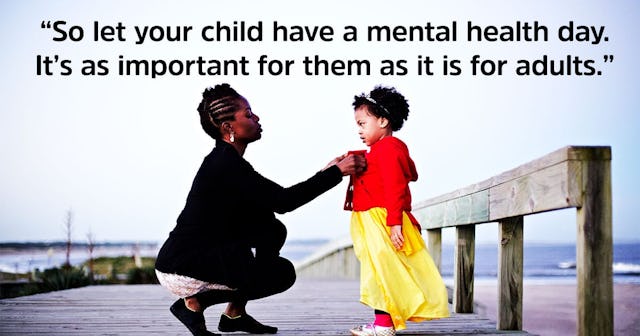Mental Health Days Are Essential — For Adults AND For Kids

When I was in high school, I started getting anxiety. Although, I didn’t really understand what it was. I knew I was scared for some reason, and I felt this pit in my gut. I stayed home from school a lot because of this. But I never said I was scared, or that I was nervous, or anything like that because I knew it would be shrugged off as some “not real” illness. So I’d say I was sick. I’d fake a cold or a stomach bug. Sometimes I forced myself to throw up.
RELATED: Can Stress Make You Sick? The Dozens Of Silent Ways Your Body Is Affected By Stress
I have to believe that anyone who struggled with anxiety or depression in high school has a very similar narrative. The last thing you ever said to your parents was, “I’m really depressed today. Can I stay home?” because we all knew the answer: “You’re not sick, so you need to go.” But to be real, when things were really dark for me, faking sick and staying home might have just saved my life.
I couldn’t help but think about that as I read about the state of Oregon passing a law giving students up to five mental health days in a three month period. For me, as an anxious and depressed teen who grew up to be an anxious and depressed adult, being allowed to say that I needed a mental health day, and having people actually listen rather than just blowing me off, would have been transformative. And for teens right here, right now, it is normalizing a very real struggle.
In 2019, the Pew Research Center found that anxiety and depression are a “major problem” for about 70% of teens, and that suicide is the third leading cause of death in Americans aged 10-24. Speaking for someone who lived it, mental health being viewed as legitimate as a cold or the flu, is a game changer. Naturally, Oregon is not alone. In 2018, Utah schools broadened the definition of an “excused absence” to include illnesses “which may be mental or physical.” Advocates say the change in policy will help reduce the stigma surrounding mental health and empower students to be more open in discussing their struggles.
Now listen, I don’t want to speak for all parents, but my son is about to turn 13, and he isn’t all that interested in discussing his problems with me — or anyone, for that matter. To be honest, I wasn’t interested in talking much as a teen either, so I think this is normal. I don’t think he struggles with depression, but you know what? I don’t think my parents assumed I struggled with depression. I didn’t talk about it because I didn’t want to be shamed for feeling the way I did. The last thing we as parents of teens need is one more thing coming between us, and normalizing mental health is a great way to break down those barriers.
Teens now face very different, and in some ways, much harsher and relentless challenges. From school shootings to bullying (both in real life and online) to body image to political unrest, our kids are carrying a heavy emotional load along with typical academic anxiety. Experts say mental health should be treated more like physical health, and I agree with them. Kids should be able to say they’re struggling and take a day to recover.
But I suppose the real question is, how do we as parents mange our child’s use of mental health days reasonably, and how do we get the most out of those days? There is the fear that kids will use mental health days irresponsibly. And yes, that is a real fear. But at the same time, children have used sick days irresponsibly for generations, and parents have managed somehow. I mean, take one look at Ferris Bueller’s Day Off if you have questions about that. However, we still need to be able to tell if our child is honestly in need of a mental heath day, or if they are just trying to stay home to play Fortnite.
Stephanie Lee, Psy.D., senior director of the ADHD and Behavior Disorders Center at the Child Mind Institute told Parents.com, “While we want to be responsive to our kids’ needs and signals, we also want to be sure that we aren’t inadvertently reinforcing escape. Parents should be conscious of big assignments or tests that may be approaching in their child’s schedule so that these stressors can be approached together and with support for the student.”
Furthermore, it is important to look for signs of depression, such as dramatic behavior changes, slipping grades, loss of interest in hobbies or extracurricular activities, or spending less time with friends.
It is also important to treat a mental health day similar to how you might treat a sick day. Use the time to visit a therapist, for example. Take time to rest, and unplug from social media. This can be very important because oftentimes the stress of social interaction can follow our children home via their phones.
But above all, make sure your child knows that you understand their struggle, and that you are supporting them in their fight for good mental health. Supporting your child by being understanding and compassionate, while also helping them seek the medical treatment and medication they need to stay mentally well, can have a long lasting and transformative impact on their future mental health. So let your child have a mental health day. It’s as important for them as it is for adults.
This article was originally published on